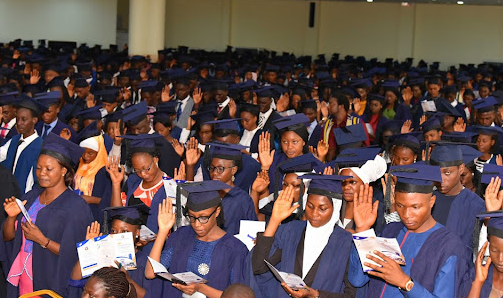BY ADEDOKUN SEYI
“Let me tell you something, if you are not on a first-class or second class upper grade, you have nowhere to go. I am telling you this now but you don’t want to listen to me. Some of you have businesses outside and your attention has been diverted. You want money and you are not ready to work for it. Just know that your place is not found anywhere”.
Today is a formal send-off for us – the freshest graduates in town – including the first class and the “last class” citizens. The University of Ibadan is sending us into the yard of hopeful unemployed graduates. It marks the end of a tumultuous journey and learning characters in a formal system where there is probably enough want.
The University of Ibadan, a fount of knowledge, is known for her November rite of organising a party for students who have fulfilled their academic oath of passing every unit, learning character and not offending elders. Today has also decided to give an indelible mark on the sands of time; a mark of discrimination, irrelevance and a mark of importance. UI is always beautiful with the temporary facelift at this time. UI, today, has explained to the first-class citizens that recte sapere fons (to think straight is the fount of knowledge) can also mean discriminating against some students.
Advertisement
It reminds me of an incident with my lecturer, Dr Agbakoba (name not real) who was angry because we were not orderly. Prior to the incident, I had regarded him as a proactive man who would encourage anyone to grow beyond the leaf. Whether it was by slip of tongue or in anger, his words remain evergreen in the mind of his students. Agbakoba said we had nowhere to go because we were not graduating with first class and second class upper. It also reminds me of Dr Wyvlef (name withheld), who once told us that he could make students fail his course if care was not taken and that he would raise issues against the students if he is reported to the authorities for disciplinary action. Since he had his power, the students cowardly kept going like sheep. This paints a picture of the relationships we have had with some lecturers and what they have said about our class of degrees. However, this convocation segregation is probably the worst.
Temilade is a corps member, a second class (upper division) graduate who had planned this day like it would be her last. She had informed her uncle since July that her convocation ceremony would be in November and she needed to celebrate the feat. She had no reason to give for graduating with 2:1 since everyone will surely graduate with something. She had planned her photoshoot with friends at the nearest studio. Temilade would not waste time to get a tent – she wanted to rent a hall that would cater for hundreds of people. She was ready to celebrate. The elation that the day was near was bright on her. However, she is in Bauchi state watching first-class students sit on chairs with their names emblazoned on them.
UI had said in a circular that students who do not have first-class degrees cannot be the face of the institution. We also read that the action was to reduce the number of occupants at the International Conference Centre where the ceremony was to hold to obey Covid-19 guidelines. Names of first class citizens were inscribed in the chairs so that trust will be upheld. Nobody is to be trusted. They have told other classes to getat (a contemporary way of saying “get out”).
Advertisement
Several comments since the release of the circular show varying degrees of indifference, pain and happiness. Those that have their names on the chairs have said “to God be the glory” and the rest of us are trying to understand what to say. If we say the same thing, people will ask if we have graduated with a first class and if we do not, some will ask why our pictures are not around. Several comments have been made to express pain – comments of how a student who graduated with second class lower was going to be celebrated but has finally been disenfranchised.
During our undergraduate days – final year – short videos of joyous expressions surfaced online. One was that of a fresh graduate that was dancing with his siblings and parents. His mother could not contain the joy that her son had become a graduate, and most importantly was that he was going to be a man. The 30-second video showed his friends dancing with glee and flipping their caps. This did not explain if they graduated with a first-class but it explained the joy in marking the beginning of another chapter in their lives.
‘O le ku’, a movie adaptation of Akinwunmi Ishola’s novel with the same title, is a 1997 Nigerian romantic drama movie that chronicles the love life of Ajani and Shade, Lola and Asake as the birds hovering over his nest. Ajani had some friends with whom he shared a rendition on a special evening. The song “igba die loku ta o ni bawon kawe mo, owo la o maka” (loosely translated to mean “soon, we will stop reading school books and start counting money”). Back at the university, many of us would sing this song aloud to fight the boredom that reading brings. We had hoped that we would celebrate the feat of graduating but for many of us, it is a sharp pain — not for the class of degree — but the image it has created about us to people who are unable to think well and for some of us, we are happy that we are not left behind.
Adedokun graduated from the University of Ibadan with second class lower division and he is an aspiring business executive and entrepreneurial educator. He can be reached on [email protected]
Advertisement
Views expressed by contributors are strictly personal and not of TheCable.






